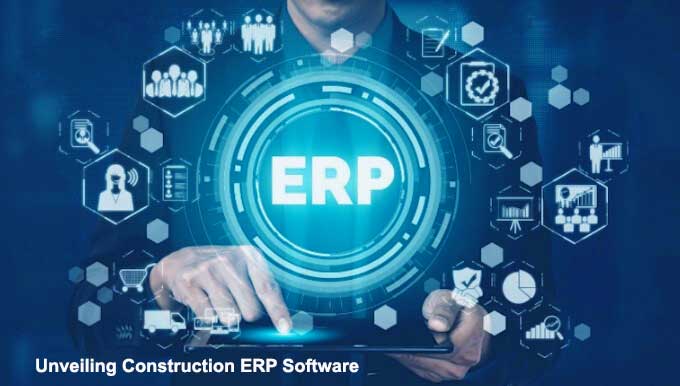In the dynamic world of construction, where precision, coordination, and efficiency are paramount, Construction Enterprise Resource Planning (ERP) software stands out as a vital tool.

This article explores the features, benefits, and significance of Construction ERP Software in revolutionizing the way construction projects are planned, executed, and managed.
Unveiling Construction ERP Software
Tailored for Construction Industry
Construction ERP Software is specifically designed to meet the unique needs and challenges of the construction industry. It addresses aspects like project management, resource allocation, financials, and collaboration within a unified platform.
Centralized Project Management
At its core, Construction ERP Software provides a centralized hub for comprehensive project management, enabling seamless control over all facets of construction projects.
Key Features of Construction ERP Software
Project Cost Tracking
Efficient project cost tracking is a hallmark of Construction ERP Software, allowing stakeholders to monitor expenses, budgets, and financial aspects of construction projects in real time.
Resource Planning and Allocation
Construction projects demand precise resource planning. ERP Software facilitates optimal allocation of labor, equipment, and materials, ensuring efficient utilization throughout the project lifecycle.
Subcontractor Management
With multiple subcontractors often involved in construction projects, ERP Software streamlines subcontractor management, enhancing coordination and communication for timely project completion.
Document Management
Construction projects generate a vast amount of documents. Construction ERP Software centralizes document management, ensuring easy access, version control, and collaboration among project teams.
The Benefits of Construction ERP Software
Real-Time Project Visibility
Construction ERP Software provides real-time visibility into project progress, costs, and resource usage. This transparency empowers stakeholders with accurate information for effective decision-making.
Enhanced Collaboration
Effective collaboration is facilitated through Construction ERP Software, as it allows teams to access project data, communicate, and share information within a unified digital environment.
Compliance and Risk Mitigation
Ensuring compliance with industry regulations and proactively managing risks are critical functions of Construction ERP Software, helping construction firms navigate complex legal and safety landscapes.
Increased Operational Efficiency
By automating routine tasks and optimizing processes, Construction ERP Software contributes to increased operational efficiency and overall productivity in construction projects.
Implementing Construction ERP Software
Needs Assessment
Prior to implementation, a thorough needs assessment is essential. Understanding the specific requirements and goals of the construction firm ensures a tailored and effective ERP solution.
Vendor Selection
Choosing a reputable Construction ERP Software vendor is a key decision. Consider factors such as industry experience, support services, and the scalability of the ERP solution.
Training and Adoption
Comprehensive training programs should be implemented to ensure that all stakeholders, from project managers to on-site staff, are proficient in utilizing Construction ERP Software effectively.
Conclusion
Construction ERP Software emerges as a pivotal asset for construction firms seeking to enhance project management, streamline operations, and achieve greater efficiency. With features that cater to the unique demands of the construction industry, from project cost tracking to subcontractor management, Construction ERP Software empowers businesses to navigate the complexities of construction projects with precision and success.